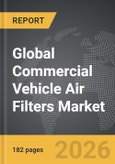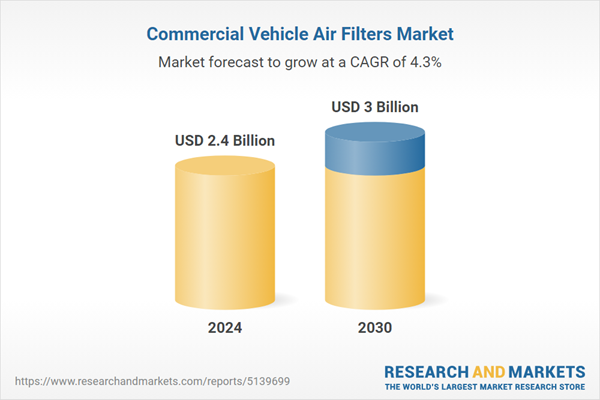Global Commercial Vehicle Air Filters Market - Key Trends and Drivers Summarized
How Are Commercial Vehicle Air Filters Enhancing Engine Efficiency and Air Quality?
Commercial vehicle air filters play a crucial role in maintaining both engine performance and the overall air quality within commercial vehicles. These filters are designed to trap harmful contaminants, including dust, dirt, pollen, and other particles, from entering the engine or the vehicle's cabin, ensuring clean airflow and optimal engine function. In heavy-duty trucks, buses, and other commercial vehicles that travel long distances or operate in harsh environments, air filters are essential in preventing wear and tear on engine components. By filtering out debris, they help maintain engine efficiency, reduce fuel consumption, and lower emissions. Moreover, in-cabin air filters are becoming increasingly important for protecting driver health by ensuring that the air inside the vehicle is free from pollutants, allergens, and particulate matter. As regulatory pressures on vehicle emissions and air quality continue to tighten, the demand for high-performance commercial vehicle air filters is steadily growing, making them a critical component in maintaining both vehicle performance and compliance with environmental standards.What Technological Innovations Are Improving Commercial Vehicle Air Filters?
The commercial vehicle air filter market has seen several technological advancements that significantly improve filtration efficiency, durability, and environmental sustainability. One of the key innovations is the use of advanced filtration materials, such as nanofiber technology, which enhances the filter's ability to capture smaller particles while maintaining optimal airflow to the engine. Nanofiber filters are particularly effective in heavy-duty applications, where vehicles are exposed to high levels of dust and debris. These materials provide superior filtration without sacrificing engine performance, ensuring that commercial vehicles can operate at peak efficiency for longer periods. Another critical advancement is the development of multi-layered filtration systems, which combine different materials to target various contaminants. For example, some filters now include activated carbon layers that can trap odors and harmful gases, improving cabin air quality for drivers. Additionally, smart monitoring systems are being integrated into modern air filters, allowing fleet managers to monitor the filter's condition in real-time. This technology enables predictive maintenance, ensuring that filters are replaced before they become clogged or cause engine issues, thus reducing vehicle downtime and extending the life of the engine. These technological improvements not only enhance the effectiveness of commercial vehicle air filters but also contribute to lower maintenance costs and better fuel efficiency.What Market Trends Are Shaping the Adoption of Commercial Vehicle Air Filters?
Several key trends are driving the adoption of commercial vehicle air filters, reflecting both technological advancements and evolving industry demands. One of the most significant trends is the increasing focus on environmental sustainability and the need to reduce vehicle emissions. As governments worldwide implement stricter emissions regulations, fleet operators are under pressure to ensure their vehicles meet these standards. High-performance air filters that improve engine efficiency and reduce exhaust emissions are becoming a vital part of compliance strategies. Another important trend is the growing emphasis on driver health and safety. In-cabin air filters, which were once considered optional, are now gaining widespread adoption as companies recognize the importance of providing clean, breathable air for drivers, especially in urban environments with high levels of pollution. The rise of electric and hybrid commercial vehicles is also shaping the market for air filters. Although these vehicles have different filtration needs than traditional combustion engines, they still require high-quality air filters to maintain the efficiency of HVAC systems and cabin air quality. Additionally, the adoption of fleet management technologies is driving demand for smart air filters equipped with monitoring systems that provide real-time data on filter performance, enabling proactive maintenance and reducing vehicle downtime.What Is Driving Growth in the Commercial Vehicle Air Filter Market?
The growth in the commercial vehicle air filter market is driven by several factors related to technological advancements, regulatory pressures, and changing operational needs in the transportation and logistics sectors. One of the primary growth drivers is the increasing stringency of emissions regulations, particularly for heavy-duty trucks and buses. These regulations are pushing fleet operators to adopt high-efficiency air filters that help reduce particulate emissions and improve overall engine performance, contributing to cleaner and more sustainable operations. Another significant factor is the rise in long-haul transportation and logistics, which has created a growing demand for durable air filters capable of withstanding harsh environments and extended usage. Technological advancements, such as the development of nanofiber filters and multi-layered filtration systems, are also fueling market growth by providing more effective solutions for capturing fine particles and improving cabin air quality. In addition, the growing emphasis on driver health and safety is driving the adoption of advanced in-cabin air filters, as companies seek to improve working conditions for their drivers by minimizing exposure to harmful pollutants. The increasing use of electric and hybrid commercial vehicles, which require specialized air filtration solutions, is also contributing to market expansion. Finally, the adoption of predictive maintenance technologies is boosting demand for smart air filters that offer real-time monitoring and diagnostics, helping fleet operators reduce maintenance costs and vehicle downtime. These combined factors are driving the sustained growth of the commercial vehicle air filter market across a variety of industries.Report Scope
The report analyzes the Commercial Vehicle Air Filters market, presented in terms of market value (USD). The analysis covers the key segments and geographic regions outlined below.- Segments: End-Use (OEM, Aftermarket).
- Geographic Regions/Countries: World; United States; Canada; Japan; China; Europe (France; Germany; Italy; United Kingdom; Spain; Russia; and Rest of Europe); Asia-Pacific (Australia; India; South Korea; and Rest of Asia-Pacific); Latin America (Argentina; Brazil; Mexico; and Rest of Latin America); Middle East (Iran; Israel; Saudi Arabia; United Arab Emirates; and Rest of Middle East); and Africa.
Key Insights:
- Market Growth: Understand the significant growth trajectory of the OEM End-Use segment, which is expected to reach US$1.7 Billion by 2030 with a CAGR of 4.8%. The Aftermarket End-Use segment is also set to grow at 3.7% CAGR over the analysis period.
- Regional Analysis: Gain insights into the U.S. market, valued at $630.8 Million in 2024, and China, forecasted to grow at an impressive 7.3% CAGR to reach $639.6 Million by 2030. Discover growth trends in other key regions, including Japan, Canada, Germany, and the Asia-Pacific.
Why You Should Buy This Report:
- Detailed Market Analysis: Access a thorough analysis of the Global Commercial Vehicle Air Filters Market, covering all major geographic regions and market segments.
- Competitive Insights: Get an overview of the competitive landscape, including the market presence of major players across different geographies.
- Future Trends and Drivers: Understand the key trends and drivers shaping the future of the Global Commercial Vehicle Air Filters Market.
- Actionable Insights: Benefit from actionable insights that can help you identify new revenue opportunities and make strategic business decisions.
Key Questions Answered:
- How is the Global Commercial Vehicle Air Filters Market expected to evolve by 2030?
- What are the main drivers and restraints affecting the market?
- Which market segments will grow the most over the forecast period?
- How will market shares for different regions and segments change by 2030?
- Who are the leading players in the market, and what are their prospects?
Report Features:
- Comprehensive Market Data: Independent analysis of annual sales and market forecasts in US$ Million from 2024 to 2030.
- In-Depth Regional Analysis: Detailed insights into key markets, including the U.S., China, Japan, Canada, Europe, Asia-Pacific, Latin America, Middle East, and Africa.
- Company Profiles: Coverage of players such as ACDelco, Ahlstrom-Munksjo, ALCO Filters Ltd., Baldwin Filters, Inc., Cummins, Inc. and more.
- Complimentary Updates: Receive free report updates for one year to keep you informed of the latest market developments.
Some of the 13 companies featured in this Commercial Vehicle Air Filters market report include:
- ACDelco
- Ahlstrom-Munksjo
- ALCO Filters Ltd.
- Baldwin Filters, Inc.
- Cummins, Inc.
- Denso Corporation
- Donaldson Co., Inc.
- Freudenberg Filtration Technologies SE & Co. KG
- Hastings Premium Filters
- Hengst SE
This edition integrates the latest global trade and economic shifts into comprehensive market analysis. Key updates include:
- Tariff and Trade Impact: Insights into global tariff negotiations across 180+ countries, with analysis of supply chain turbulence, sourcing disruptions, and geographic realignment. Special focus on 2025 as a pivotal year for trade tensions, including updated perspectives on the Trump-era tariffs.
- Adjusted Forecasts and Analytics: Revised global and regional market forecasts through 2030, incorporating tariff effects, economic uncertainty, and structural changes in globalization. Includes historical analysis from 2015 to 2023.
- Strategic Market Dynamics: Evaluation of revised market prospects, regional outlooks, and key economic indicators such as population and urbanization trends.
- Innovation & Technology Trends: Latest developments in product and process innovation, emerging technologies, and key industry drivers shaping the competitive landscape.
- Competitive Intelligence: Updated global market share estimates for 2025, competitive positioning of major players (Strong/Active/Niche/Trivial), and refined focus on leading global brands and core players.
- Expert Insight & Commentary: Strategic analysis from economists, trade experts, and domain specialists to contextualize market shifts and identify emerging opportunities.
Table of Contents
Companies Mentioned (Partial List)
A selection of companies mentioned in this report includes, but is not limited to:
- ACDelco
- Ahlstrom-Munksjo
- ALCO Filters Ltd.
- Baldwin Filters, Inc.
- Cummins, Inc.
- Denso Corporation
- Donaldson Co., Inc.
- Freudenberg Filtration Technologies SE & Co. KG
- Hastings Premium Filters
- Hengst SE
Table Information
| Report Attribute | Details |
|---|---|
| No. of Pages | 182 |
| Published | February 2026 |
| Forecast Period | 2024 - 2030 |
| Estimated Market Value ( USD | $ 2.4 Billion |
| Forecasted Market Value ( USD | $ 3 Billion |
| Compound Annual Growth Rate | 4.3% |
| Regions Covered | Global |









